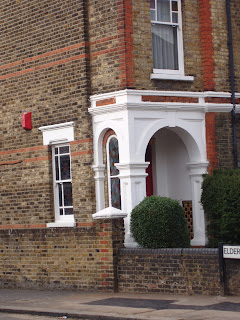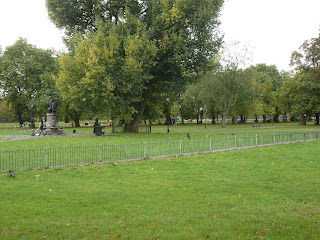It was always in the back of my mind that I wanted to write a novel about the people living on a typical 21st-century London street. Unfortunately, John Lanchester beat me to it. No great surprise, since anything at the back of my mind is invariably sat in a swamp of inertia, like the dirt behind the fridge or those pictures that never get hung on the wall. Kids happen. Novels don't. So I can hardly be cross that someone else had the same idea as me, poured themselves a coffee, sat at a desk, turned on their computer, opened a blank Word document, typed out a story and got it published. Especially as they did such a mighty fine job of it.
Capital is a rollicking read, full of well-drawn characters who are in turn funny and poignant, likeable and unlikeable, rich and poor. They are either foreign to, adopted by, or born and bred in that magnificent melting pot of cultures that make London so special - and so frustrating.
 |
| A typical London street? |
 |
| Corner shop |
There's the Polish builder. The out-of-touch banker. The banker's ghastly spendaholic wife. The Eastern European nannies raising the banker's children. The exuberant corner shop family with the matriarch in Pakistan. The parking official posting tickets onto Range Rovers, an asylum seeker working illegally. Her gospel-singing boyfriend. The policeman accused of being racist by one side of the street and overly politically correct by the other. The old lady who's lived there for 60 years and long been priced out of the property market. The old lady's distant daughter seeing the pound-signs on the walls of her inheritance. The old lady's grandson, a Banksy style street artist. There's also - in the book - a Premiership footballer, but it seems that they couldn't afford his transfer fee to television.
 |
| We want what you have? |
For yes, now there's a mighty fine television adaptation of
Capital to enjoy too, with a brilliant cast and the atmosphere of the novel captured perfectly - the greed, the anger, the sadness, and the different senses of family, whether close, distant, interfering, aloof, loud, or lonely. There isn't much joy - a pilates class for Arabella, a hot date for Bogdan, a curry round the Kamal family table - and what little there is seems to always have a darker, bitter side. And yet somebody is sending every resident on Pepys Road postcards saying "We Want What You Have", and photographing their windows and doors. They are indeed enviably beautiful doors of stained glass, with porches and paths of Victorian tiles. Who wouldn't want to afford one of their own on a desirable Clapham street, just round the corner from the Common, the cafes and the Tube?
 |
| I have been known to go round photographing London doors and windows |
But if the sender of the postcards is desiring wealth, then take heed, for the most moneyed residents are definitely not happy with their lot. The banker, Roger Yount, finds his world is slowly unravelling. It all starts when his bonus is a mere 30,000 pounds, as opposed to the two million that he was predicting and that his wife Arabella was already spending on renovations. "What on earth can anyone do with 30,000 pounds?" he roars at his dour German boss. (Well, if it was me, quite a lot actually.) Arabella refuses to believe that they may need to cut costs on such essential items as second homes, prep school fees and pomegranate molasses, and takes herself off to a spa for Christmas, leaving Roger alone with the children, their poo, their Lego and an unexpected sofa delivery. Although it's nothing that a quick call to a nanny agency can't resolve.
But the postcards may be wreaking havoc with the property prices (currently spiralling upwards literally in front of our eyes as the months go by). And Roger's upstart junior has also hacked into the bank's systems and is doing some dodgy trading which can only lead to crash. Crash and burn.
 |
| Clapham Old Town, where I rented a room for half my salary |
 |
| Clapham High Street |
There is drone footage of familiar South London suburbs - Clapham, Wandsworth, Balham, Streatham - and their avenues of plane trees, their commons and lidos. There is a double decker bus on Tooting Broadway, an MRI scan at St George's Hospital. There are ice creams in Battersea Park, near the Peace Pagoda and Albert Bridge. And a Merry Christmas wished between strangers on the greenest Clapham Common I have ever seen in the depths of winter. with the trees in full foliage. That's global warming for you.
 |
| Clapham Common in full foliage |
For me, it always was the green spaces like Clapham Common that made London bearable. Otherwise you find yourself craving, if not screaming for, the countryside. It seems you cannot spend your life without grass. If you can't afford that second home in the country, then eventually you move away to the country. But you will very possibly long to return to London, our great
Capital, as soon as you get there.
No comments:
Post a Comment